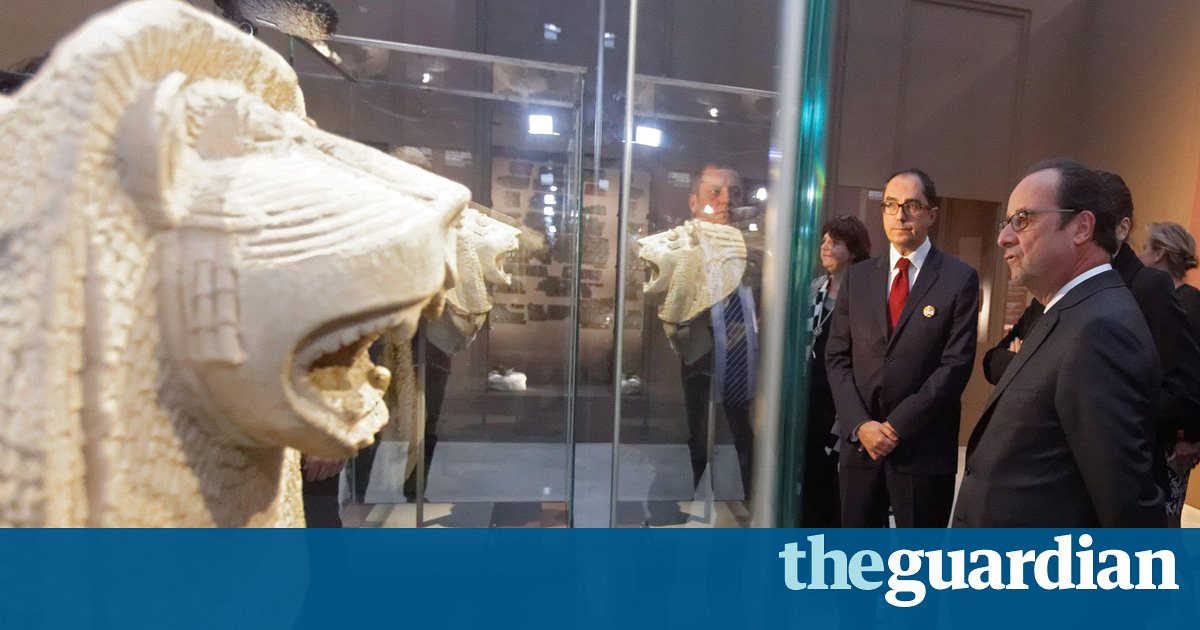Louvre to offer shelter for world treasures rescued from war zones

New secure facility in northern France could become temporary repository for artefacts in danger of being destroyed, says Hollande

The Louvre Museum is to offer a haven for world treasures rescued from war zones such as Syria and Iraq at a secure storage facility in northern France.
The French president, Franois Hollande, said the new conservation facility in Livin could become a temporary repository for international cultural and artistic treasures.
Speaking as he unveiled a plaque for the 60m (55m) building, which is scheduled to open in 2019, Hollande said he would propose the idea at a conference on endangered heritage in Abu Dhabi in December, which is expected to be attended by representatives from about 40 countries.
He said the conservation facility would be unique in Europe. The principle role of the Livin site will be to house the Louvre Museums stored collection but it could have another role, sadly linked to the events, dramas, tragedies that we see in the world.
Hollande said this concerned works that were in danger because terrorists or barbarians have decided to destroy them particularly those in Syria and Iraq.
He added: In Abu Dhabi the international community will decide to protect, to promote and even to finance the restoration of a certain number of works. And we are going to suggest that the Livin conservation site is where such works can be protected.
The French-led conference on culture and terrorism will launch a fund that aims to raise $100m (80m) to help save art that is threatened. Its three priorities will be to combat the international trade in antiquities, to temporarily house endangered cultural property from other countries and to preserve the memory of destroyed sites of cultural importance.
Islamic State and other militant groups have targeted the cultural heritage of Iraq, Syria, Afghanistan, Libya and Mali, looting treasures to sell and razing ancient sites.
In the Syrian city of Raqqah, Isis ordered the bulldozing of a colossal ancient Assyrian gateway lion sculpture on the banks of the Euphrates, dating from the 8th century BC, while in Iraq the group destroyed the remains of the Assyrian city of Nimrud. In 2001, the Taliban in Afghanistan dynamited and destroyed the Buddhas of Bamiyan that were built in the 4th and 5th centuries.
Ahmad al-Faqi al-Mahdi, an Islamist militant who helped destroy the shrines of Timbuktu, was in September sentenced to nine years in prison in a groundbreaking case at the international criminal court.
The Louvre, which is the worlds most-visited museum, welcoming 8.6 million people last year, has a vast collection of artistic works and artefacts in its basement on the banks of the Seine in Paris. The treasures have to be moved to safety every time there is a major flood risk, as happened earlier this year.
The museum has a satellite at Lens in northern France that Hollande visited on Tuesday. The new 20,000 sq metre (215,000 sq ft) conservation centre at nearby Livin is being built by a French-British consortium.
Hollande said that as well as terrorists seeking to destroy all trace of humanity and its masterpieces, the trafficking of cultural artefacts was also a problem. We must put the worlds heritage in a secure place, he said.